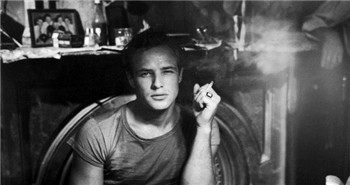
When Marlon Brando died in 2004 at 80, more than a few obituary writers decided he hadn’t been a contender, after all. For them, this brilliant actor had devolved into as much a loser as Terry Malloy, his punch-drunk boxer in “On the Waterfront,” who is sold down the river and, with a face battered by fights and the pain of a brother’s betrayal, famously eulogizes himself: “I coulda been a contender, I coulda been somebody, instead of a bum, which is what I am.” Those who dismissed Brando reviewed his life as if it were some kind of movie, one with a strong opening act, a bewildering middle and a disappointing conclusion deserving of a collective thumbs down.
2004年80岁的马龙·白兰度(Marlon Brando)去世时,不少讣告作者认为,他终究不是一个夺冠热门。在他们看来,这位聪明的演员堕落成了一个失败者,就像《码头风云》(On the Waterfront)里被他打得头晕眼花的拳击手特里·马洛伊(Terry Malloy)。马洛伊遭到兄弟出卖,他带着脸上的拳伤和心头的创伤,却还称赞自己道(这句话很出名):“我本应该是一个夺冠热门,本应是一个大人物,而不是现在这样的脓包。”那些否定白兰度的人像评价某种电影那样评价他的一生——说它开场宏大,中间部分让人迷惑,结尾令人失望,应该遭到一致否定。
That’s the straight world’s take on Brando — call it the revenge of the mediocre on genius — and one reason it’s such a blast to hear the man himself talking about that life in the documentary “Listen to Me Marlon.” The movie is almost entirely narrated by Brando, largely through snippets of audio recordings that he made over decades. Although it opens with a bit of text about the recordings, it doesn’t explain how the British director Stevan Riley and his collaborators got their hands on them. The press notes state that the recordings were “uniquely gifted” to the production company for the movie; a recent article in The Los Angeles Times suggests a more commercially expedient reason: The actor’s estate, Brando Enterprises, “decided it was time” for a flick to introduce him to a new generation.
那是正统世界对白兰度的看法——就当那是庸众对天才的报复吧——那也是人们在听白兰度本人在纪录片《马龙,听我说》(Listen to Me Marlon)中讲述自己一生时感到震惊的一个原因。这部纪录片几乎完全由白兰度讲述,主要由他几十年来的录音片段组成。虽然开头的一点文字介绍了录音的情况,但是没有解释英国导演斯特万·赖利(Stevan Riley)和他的合作者们是如何拿到这些录音的。出版说明上说,这些录音是“专门赠与”该制片公司以制作这部电影的。《洛杉矶时报》(The Los Angeles Times)不久前的一篇文章道出了一个从商业角度讲更合理的原因:白兰度的资产白兰度公司(Brando Enterprises)“认为现在是时候”拍一部纪录片来向新一代介绍他。
Whatever the motivations, the movie gives you the opportunity for its loquacious title subject to pour his thoughts into your ears for some 100 babbling minutes. This was a cat who could rap, as his longtime friend and former roommate James Baldwin might have said. The movie is stuffed with boldface names like Baldwin, who (with his pal Norman Mailer) first encountered Brando in Greenwich Village in the mid-1940s. “I had never met any white man like Marlon,” Baldwin later said. “He was obviously immensely talented — a real creative force — and totally unconventional and independent, a beautiful cat.” Baldwin said that Brando was “contemptuous of anyone who discriminated in any way,” adding that the actor, a professional seducer, made him feel that “reports I was ugly had been much exaggerated.”
不管动机是什么,这部纪录片让白兰度有机会用100分钟的时间喋喋不休地向你倾诉他的想法。就像他的老朋友、前室友詹姆斯·鲍德温(James Baldwin)可能会说的,他是一只会说唱的猫。片中充满了大人物,比如鲍德温。20世纪40年代中期,鲍德温(和好友诺曼·梅勒[Norman Mailer])第一次在格林尼治村遇见白兰度。“我从没遇见过像马龙这样的白人,”鲍德温后来说,“他显然极具才华,很有创造力,绝不因循守旧,非常独立,像一只美丽的猫。”鲍德温说,白兰度“鄙视任何有歧视观念的人”。他补充说,身为演员的白兰度极其善于诱惑人,以至于让鲍德温觉得“那些说我长得丑的人是在夸大事实”。
There’s not enough of the nonconformist likes of Baldwin in the movie, but then it seems impossible to cram an existence as fully lived as Brando’s — which reaches from his Nebraska childhood to California, New York, Tahiti and beyond — into a few hours. That said, you get a sense of that life because, for a celebrity who became known as a recluse in his later years, Brando played the public relations game for a very long time, as the many interview clips show. Some of these are available online, including a 1955 “Person to Person” profile by Edward R. Murrow, which was shot soon after Brando won his first Oscar, for “On the Waterfront.” It’s a thoughtful interview, as far as these things go, and Brando plays along nicely, even when his abusive father, Marlon Sr., whom he loathed, bigfoots into view.
片中像鲍德温这样不墨守成规的人不够多,但是想用几个小时讲述白兰度丰富的人生(从在内布拉斯加州的童年到加利福尼亚州、纽约和塔希提岛等)似乎是不可能的。尽管如此,这部纪录片能让你对他的真实人生有一点了解。白兰度在晚年以离群索居而闻名,但他玩公共关系这个游戏很长时间了,这一点能从很多采访片段中看出来。你能在网上看到其中一些片段,包括1955年他接受爱德华·R·默罗(Edward R. Murrow)的《面对面》(Person to Person)节目采访时的片段,当时,白兰度刚凭借《码头风云》获得第一个奥斯卡奖。总的来说,那个采访很有深度,白兰度一直友好地配合,甚至在他十分厌恶的曾虐待他的父亲老马龙闯入采访时,他依然保持克制。
While its subject means that “Listen to Me” is easy to like, Mr. Riley’s shaping of Brando’s words can make the movie, every so often, difficult to fully embrace. Mr. Riley’s handling of the fatal 1990 shooting of Dag Drollet by Christian Brando, Brando’s son, is especially unfortunate, and the use of some tabloidlike news material sleazes up the movie a touch. (Mr. Drollet was the boyfriend of Brando’s daughter Cheyenne.) Mr. Riley’s use of a disembodied, floating Brando head created from digital scans that the actor made in the 1980s is initially amusing, but it’s a needless distraction, as are the cutaways to murkily lit, messily appointed rooms that are actually re-creations of those in his Mulholland Drive mansion.
虽然这部纪录片的主题意味着,你应该很容易喜欢上它,但是赖利对白兰度话语的塑造常常让你觉得很难完全接受它。1990年,白兰度的儿子克里斯蒂安·白兰度(Christian Brando)枪杀了白兰度女儿夏恩(Cheyenne)的男友达格·德罗莱(Dag Drollet)。赖利对这一事件的处理尤为失败。另外该片还选用了一些小报式的新闻材料,拉低了影片的档次。赖利用白兰度在80年代进行的数码扫描做出了没有身体的、漂浮的白兰度头像,这东西一开始让人觉得挺好玩的,但它没什么必要,而且会分散观众的注意力。白兰度穆赫兰道宅邸里灯光昏暗、布置凌乱的房间的剖面模型,也同样没有必要。
Brando doesn’t need that kind of embellishment, and neither does this movie. As his admirer James Dean probably knew all too well, Brando was a true rebel, partly because he thought being a star was absurd and partly because, as clip after clip shows, he always had a cause, whether it was civil rights, black power, Native American sovereignty or his own independence. At its most satisfying, “Listen to Me Marlon” brings you close to a man whose legacy seems to have been tarnished less by his widely reported (and misreported) actions than by an entertainment press that punishes those who refuse to play the game. Brando found the game ludicrous. But he played along until he didn’t, and while he occasionally suffered the consequences, along with too many fools, his work outlasts it all.
白兰度和这部纪录片都不需要那种装饰。就像他的爱慕者詹姆斯·迪恩(James Dean)可能非常清楚的,白兰度是真正的叛逆者,一个原因是,他觉得当大明星很荒诞可笑,另一个原因是,就像那一段段视频展示的,他总是在争取某种权利,不管是公民权利、黑人权利、美国原住民的自治权,还是他自己的独立。最令人满意的一点是,《马龙,听我说》能让你近距离地了解这个人。玷污他的精神遗产的不是被广泛报道(或错误报道的)的他的劣行,而是那些惩罚拒绝服从游戏规则者的娱乐媒体。白兰度觉得这个游戏很荒唐。刚开始他配合,后来他就不配合了。虽然和太多傻瓜一样,他偶尔要承受这样做的不利后果,但他作品的生命力将比所有这一切更长久。












